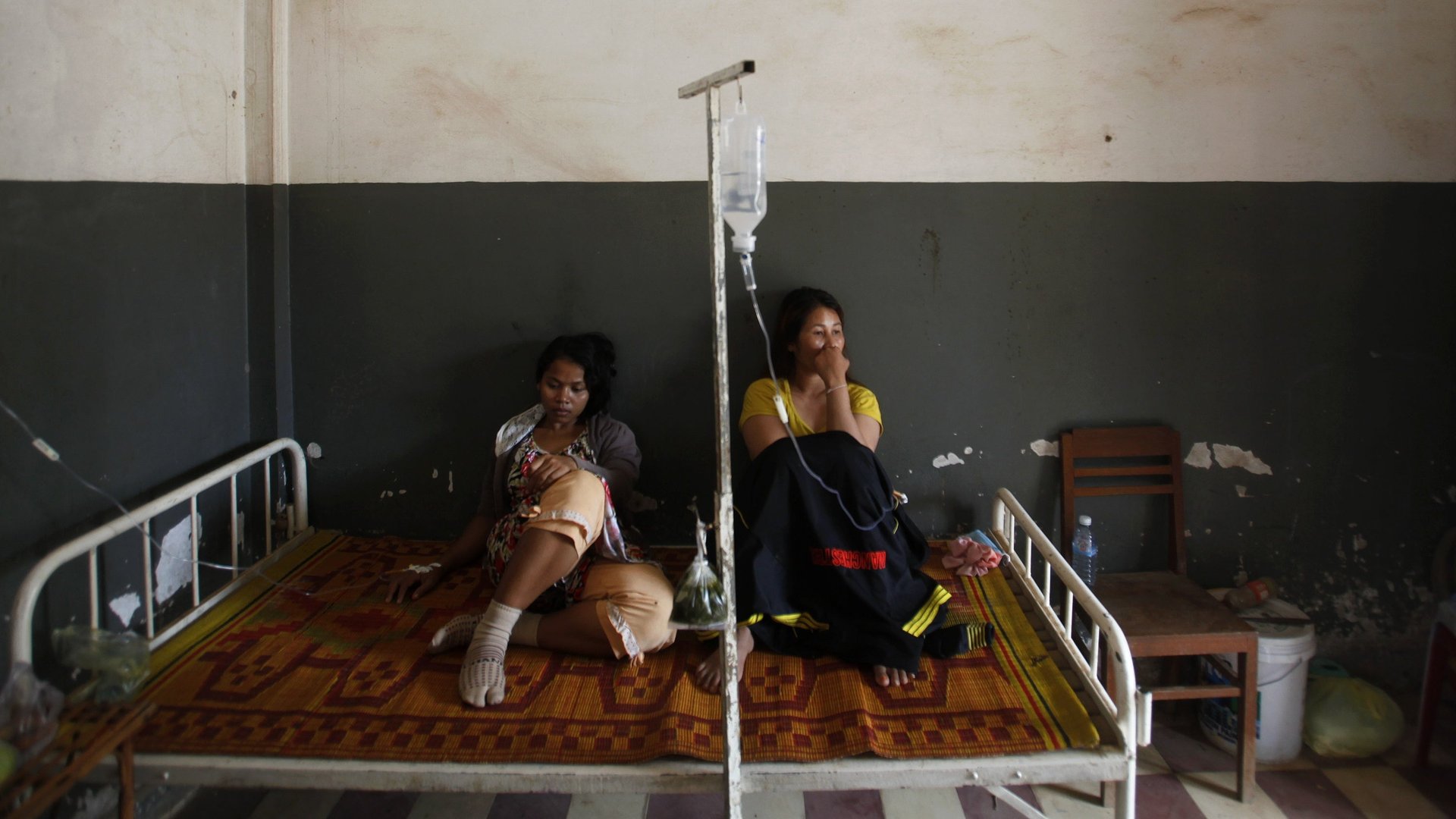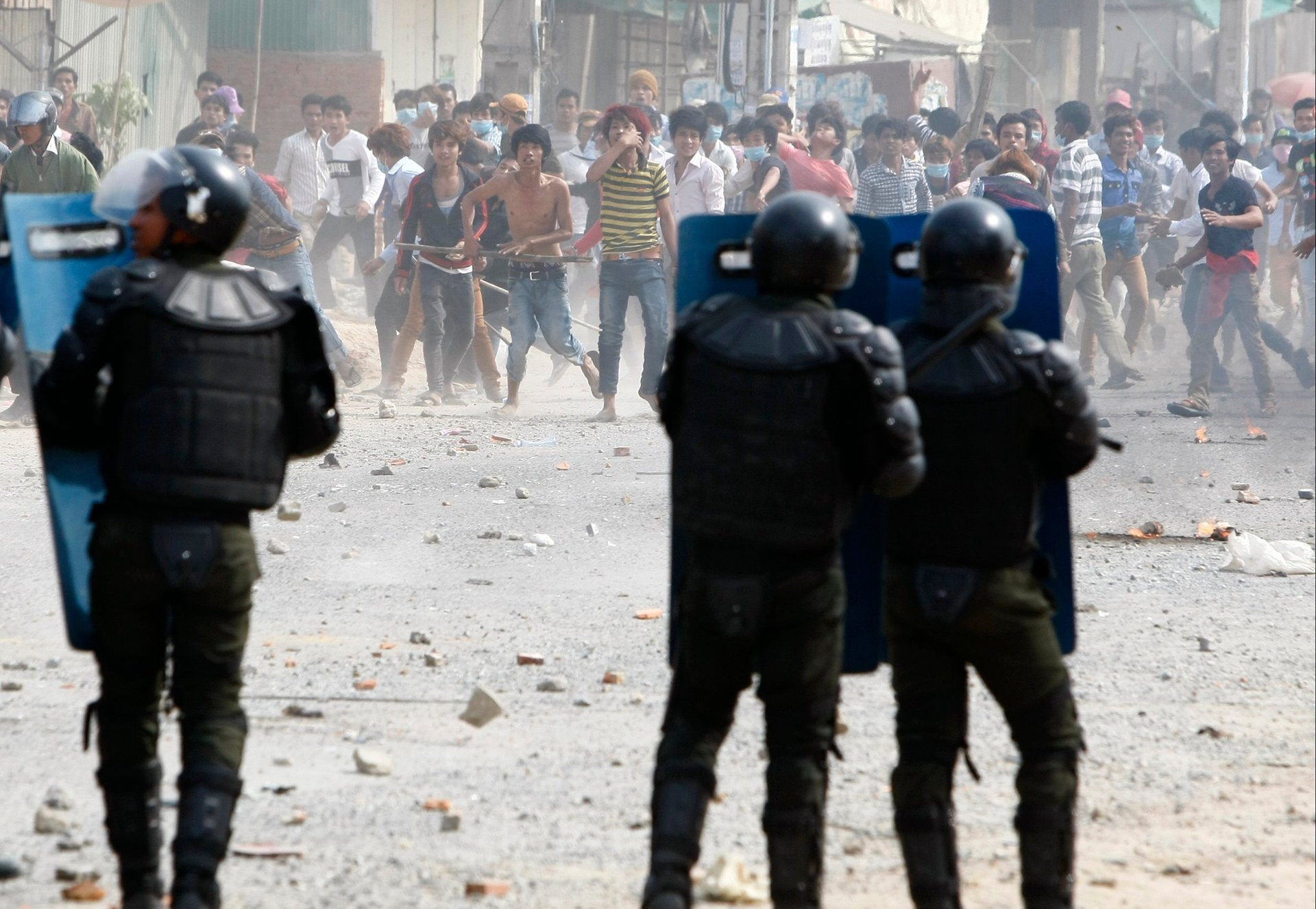“A web of terror, insecurity, and a high level of vulnerability”: H&M, Gap, and Walmart are accused of widespread worker abuse
H&M, Gap, and Walmart are three of the largest sellers of cheap clothes in the world. Like many other companies in the global garment industry, they make much of that clothing in Asian countries with low wages and little regulatory oversight, leading to widespread accounts of worker abuses.


H&M, Gap, and Walmart are three of the largest sellers of cheap clothes in the world. Like many other companies in the global garment industry, they make much of that clothing in Asian countries with low wages and little regulatory oversight, leading to widespread accounts of worker abuses.
A new series of reports by the Asia Floor Wage Alliance (AFWA), a group of trade unions and labor rights activists, has put a spotlight on those abuses, documenting some of the worst of the problems at the factories where these brands make their clothes. The AFWA’s research draws on hundreds of interviews with workers at factories used by H&M, Gap, and Walmart in countries including Cambodia, India, Bangladesh, and Indonesia.
The findings paint an ugly picture of widespread mistreatment of workers, most of them poor women. That’s far from the image these international clothing brands are eager to project.
“These [abuses] are all, to me, inhuman treatment of workers,” says Anannya Bhattacharjee, international coordinator of the AFWA. “They’re all connected and they all form a web of terror, insecurity, and a high level of vulnerability for workers.”
The reports come just as the International Labour Organization (ILO) holds its annual conference in Geneva, where the AFWA and other labor groups are urging the agency to create binding regulations ensuring better wages and conditions for workers in the global garment trade.
Here is a summary of some of the conditions workers say are standard in their factories, as documented by the AFWA:
Fired for becoming pregnant
In interviews with 251 workers from H&M’s supplier factories in Cambodia and India, the AFWA found workers at 11 of 12 Cambodian factories reported women being fired for becoming pregnant. All 50 workers from the Indian factories reported the same. These women often depend on their jobs for survival, leading many to undergo abortions in countries where the procedure can be dangerous.
H&M responded to the report by saying that the practice is far outside the bounds of the commitment it requires supplier factories to sign. “H&M does not accept termination on the grounds of pregnancy under any circumstances,” the company said in a statement (emphasis theirs).
Pressured to tolerate sexual harassment
Allegations of sexual harassment in supplier factories for all three brands were rampant. At Gap’s supplier factories in Cambodia, Indonesia, and India, the AFWA determined from interviews with 150 workers that one in five experiences sexual comments or advances, and inappropriate contact from male managers or co-workers.
Often women have no method for reporting this sort of behavior, or they may be pressured to let it continue. At Cambo Handsome, a Walmart supplier in Cambodia, women reported that they were rewarded with longer breaks and other benefits if they allowed the harassment to go on.
Unsafe and unhealthy work schedules
Given the grueling conditions some workers described, those breaks could seem a desperate necessity, not a perk. At Walmart’s Cambodian factories, work lasted ”up to 14 hours a day in sweltering heat, without adequate supply of clean drinking water or any breaks, leading to episodes of mass fainting,” the AFWA reports.
A Walmart spokesperson says the company uses “collaborative approaches to improving working conditions,” and is working with the International Labor Organization’s Better Factories Cambodia program” to make sure suppliers follow its set of standards. The company also told the New York Times (paywall) those standards “specifically address working hours, breaks, the cultivation of a safe and healthy work environment, and freedom of association.”
Gap responded to the report with a statement: “When we encounter an issue or violation of our code of vendor conduct—whether through our monitoring program or when an external group brings an issue to our attention—our approach is to drive improvements in a timely manner, oftentimes in coordination with NGOs or other civil society organizations.”
Temporary contracts
Another growing problem the AFWA found at suppliers for all three brands were temporary, fixed-duration contracts. For example, a worker may be employed on a three-month contract. If during that time she voices any grievances about harassment, demands better wages or conditions, or joins a union, the factory can easily choose to not renew her contract.
H&M calls these contracts an “industry-wide problem” and says it’s trying to address it. Since 2015 it has required that workers have contracts valid for an unlimited time, but that only applies to workers who have been employed for more than two years.
Suppression of efforts to organize
Workers’ attempts to protest or unionize have been violently suppressed at times. In Cambodia, paramilitary groups such as Brigade 911 and the police break up worker protests, and workers have been killed in the process.

Wage theft
Workers at supplier factories for all three brands reported being forced to work overtime or faced firing, verbal abuse, or beatings. Many workers producing for Gap said they didn’t even receive the legally mandated overtime rates. The AFWA calls it “wage theft,” and says overtime pay isn’t the only problem. At H&M’s supplier factories in India, for instance, workers reported earning less than the minimum wage demanded by Indian law.
The AFWA is attending the ILO conference in Geneva to call for regulations that would put an end to these practices and establish a living wage for garment workers—meaning one that provides a decent standard of living, not just the bare minimum. According to its calculations, which use purchasing power parity to determine a living wage in various countries, workers in Bangladesh and Sri Lanka, to take two examples, now make about a fifth of a living wage.
Brands often argue that they don’t own the factories directly and don’t decide what workers earn. “We’re not setting the wages,” Karl-Johan Persson, CEO of H&M, has said. Walmart told the New York Times that it doesn’t own or operate the factories it sources from, and in a statement said it encourages suppliers to provide wages that provide income beyond basic needs. It also noted that its standards specify that suppliers provide overtime pay and benefits that “meet or exceed legal standards or collective agreements, whichever are higher.”
Brands note that these problem are not theirs alone. “The issues addressed in the [AFWA] report are industry-wide problems,” a spokesperson for H&M said. “They are often difficult to address as an individual company and we firmly believe that collaboration is key.” Gap echoed the sentiment in its statement.
The AFWA disputes the claim that brands aren’t responsible for wages. They seek out the lowest prices in countries with poor populations who need work, creating a pricing race to the bottom where worker pay is what’s ultimately squeezed most, according to Bhattacharjee. “The way the system is structured right now is highly unequal, not profitable sufficiently for production countries, and highly exploitative of a very large labor force,” she says.
But on whether these problems extend beyond H&M, Gap, and Walmart, the AFWA couldn’t agree more. In a press release for its H&M report, it noted that “the sheer scale of rights violations” it had found “are fundamentally linked to the structure of the garment global value chain as a whole.”
Still, Bhattacharjee says brands just aren’t doing enough to police themselves. H&M supposedly has pilot factories where it’s testing a living wage (paywall), but the AFWA says H&M won’t give it access to the names of these factories. H&M is under no obligation to do so, but Bhattacharjee says they’ve been unable to find anyone who has ever worked in one.
“Voluntary enforcement is not working, which is why we need binding regulation with grievance procedures, arbitration procedures,” she says. “This has to happen at a global level. We believe the ILO is in the best position to do it.”
As of now, it appears the ILO believes there is no regulatory gap. The agency has not replied to our request for comment on how responsible it believes it should be in regulating the industry.
This story was updated with statements from Walmart.